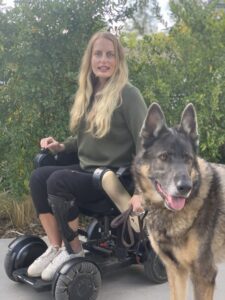Colette Wheeler is one of four siblings, and although each had only a 50/50 chance of inheriting the genetic mutation that leads to facioscapulohumeral muscular dystrophy (FSHD), all of them drew the muscular dystrophy card. For each, their FSHD has expressed differently. Patient Worthy had the privilege of speaking to Colette about love and work and FSHD. Below is a summary of our conversation. But first a quick description:
Facioscapulohumeral muscular dystrophy (FSHD) affects the muscles of the face, the scapula (the “wing” bones of the back), and the upper arms first. It occurs in both males and females and is often diagnosed in late teens or early adulthood. It can be very mild (with about 50% of individuals retaining the ability to walk throughout their lives) or totally disabling. It is the third most common form of muscular dystrophy.

LOVE
Colette married her college sweetheart, whom she met while riding the bus to Berkley. All four siblings are in relationships. Since most young adults with a rare condition struggle in the area of relationships, we asked Colette to comment on this.
“My husband loves me regardless of my FSHD. You must come from a place of self love. You have to love yourself for who you are before you are ready to share yourself with others. When people love themselves and when you feel confident and happy, you attract love. There are a lot of inter-abled couples. I am a big stand –up comedy fan, and I remember one disabled comedian saying- ‘ If you have a disability you just have to open with it. That way you can move past that. We are very complex individuals.’ “
Any advice for the parents of teens?
By meeting other families and hopefully teens and young adults who also have disabilities their child can hopefully realize the many possibilities available to them for their future. Through connection comes normalization in a world that often treats people with disabilities as the “other.” But they can learn valuable tips and tricks for managing the challenges for living with a disability. For teens, I encourage them to fill their social media feed with other people and influencers who have disabilities by following #disabledandcute on Instagram or following disability activists like @cardenofmilk, @mrchinnn_, @wheelchair_rap unzel and @disabilityinclusioneducator (more for the parents). Tina of @disabilityinclusuoneducator has a lot of amazing resources for parents with children with disabilities, like the best disability inclusion books that positively feature people with disabilities. They are an easy tool for parents of younger kids to fill their home libraries with because normalization and acceptance starts at home.
WORK
FSHD, like all muscular dystrophy, is progressive. Colette worked for a long time in corporate America until she felt it was no longer good for her health. Each place she worked she described as
“Accommodating, respectful and supportive. Many companies are making strides. However some companies just do things that signal their virtue- like changing the image and the words on the handicapped parking. Changing signs does not change actions. What is really needed is flexibility and accommodation for meaningful work. Only one in 5 disabled individuals work. It is not because they don’t want to. It is hard. Remember disability can happen any time in your life. We have systems in place that can make it very difficult to live your life with dignity, because it is a very rigid system that almost punishes people who have been successful in finding work. When something happens- a wheel chair breaks down, or a special car or van is needed, many people have to resort to a GoFundMe. It is a reflection of how we, as a nation value a community. States differ greatly in how much and how well they support the disabled.”
PROGRESS
“I am so hopeful for the progress in gene therapy, CRISPR, and medications. I think it is going to be a sea of change. I have benefited from the capitalistic society which has led to these developments and many federal tax dollars have contributed to the development of treatment. New drugs will have inherent risk. Right now only about 50% of Medicaid patients can access these new treatments. We need a framework that continues to reward these developers but we want the products to be like the polio vaccine- anyone can have the polio vaccine.”
COMMUNITY
“It is so important for rare disease patients to connect with each other. I have built a community from other FSHD people. They are now an extended family. There is power in numbers. It is hard to feel strong when you are alone. I lead the local chapter of the Los Angeles FSHD Society. There are also Facebook groups to join too. Get connected.”


